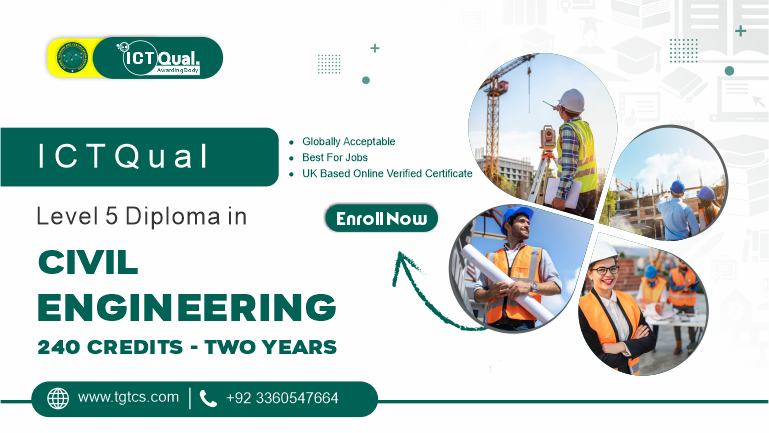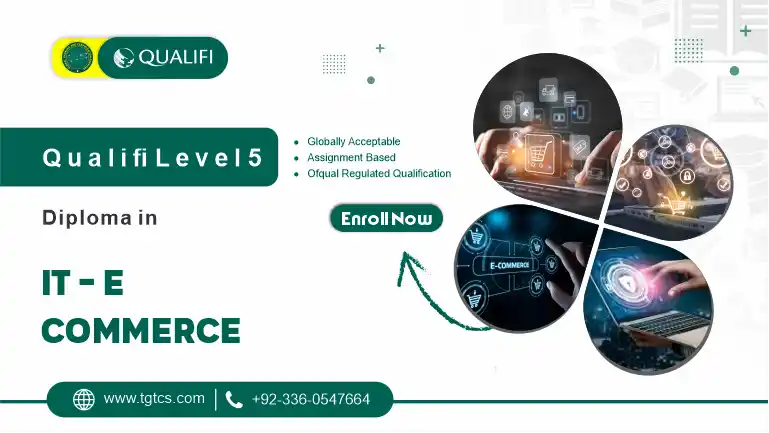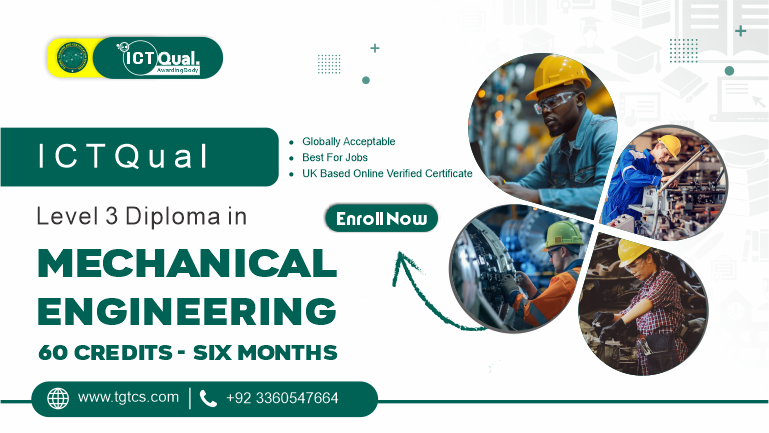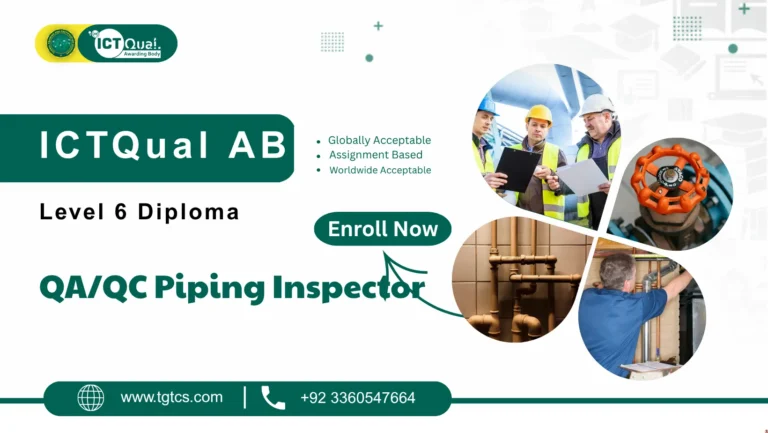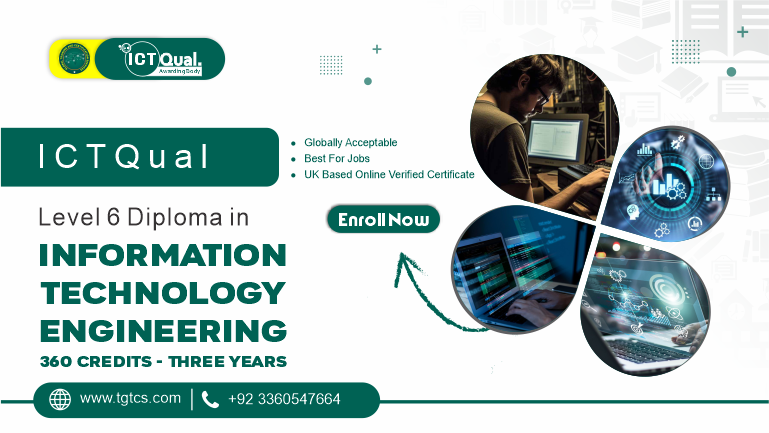ICTQual Level 5 Diploma in Civil Engineering 240 Credits-Two Years
The ICTQual Level 5 Diploma in Civil Engineering (240 Credits) is an accredited, industry-recognized qualification designed for individuals aiming to excel in the civil engineering sector. This comprehensive two-year course offers practical knowledge and skills needed for real-world applications, preparing students for advanced roles in civil engineering.
Whether you’re already in the engineering field or looking to transition into this exciting industry, the ICTQual Level 5 Diploma in Civil Engineering provides a structured pathway to boost your career. With a focus on both theoretical and practical aspects, this diploma enables students to tackle complex civil engineering projects, from planning and design to construction and management.
The ICTQual Level 5 Diploma in Civil Engineering offers an in-depth, practical education in civil engineering, setting you up for success in a rewarding and high-demand field. With its comprehensive curriculum, industry relevance, and hands-on learning approach, this qualification is the ideal stepping stone for anyone serious about pursuing a career in civil engineering.
The Global Training and Certification Services (TGTCS) is Directly Approved Training Centre of ICTQual
The ICTQual Level 5 Diploma in Civil Engineering is a comprehensive two-year course designed to provide students with the knowledge and practical skills required for advanced roles in the civil engineering industry. This 240-credit qualification covers key areas such as structural engineering, construction management, geotechnical engineering, and environmental sustainability.
The course combines theoretical learning with hands-on experience, preparing graduates for various career paths, including civil engineer, project manager, and structural engineer. Recognized internationally, this diploma offers flexible study options and equips students with the expertise needed to succeed in the global civil engineering job market.
Mandatory Units
The Units of Level 5 Diploma in Civil Engineering 240 Credits-Two Years are as ;
Year 1:
- Engineering Principles and Applications
- Mathematics for Civil Engineers
- Structural Mechanics
- Materials Science and Technology
- Geotechnical Engineering
- Hydraulics and Fluid Mechanics
- Surveying and Measurement Techniques
- Engineering Drawing and CAD
- Construction Technology
- Project Management for Engineers
- Advanced Structural Analysis
- Environmental Engineering
Year 2:
- Transportation Engineering
- Construction Management and Law
- Water Resources Engineering
- Building Information Modeling (BIM)
- Advanced Geotechnical Engineering
- Structural Design in Concrete and Steel
- Risk Management in Civil Engineering Projects
- Sustainable Construction Practices
- Advanced Hydraulics and Fluid Flow
- Urban Infrastructure and Development
- Smart Cities and Technology in Civil Engineering
- Capstone Project and Dissertation
Below are the learning outcomes for each study unit in the ICTQual Level 5 Diploma in Civil Engineering program:
Year 1: Foundation and Core Knowledge (120 Credits)
- Engineering Principles and Applications
- Apply fundamental engineering principles to solve real-world civil engineering problems.
- Demonstrate knowledge of mechanics, thermodynamics, and fluid dynamics in engineering contexts.
- Solve basic engineering challenges using analytical methods.
- Mathematics for Civil Engineers
- Use mathematical tools like calculus, algebra, and statistics to tackle complex civil engineering problems.
- Analyze and interpret mathematical data in the context of engineering projects.
- Apply advanced mathematics in structural and systems analysis.
- Structural Mechanics
- Analyze the behavior of structures under various loads using engineering principles.
- Apply concepts such as bending, shear, torsion, and axial forces to structural analysis.
- Design simple structural elements considering load factors.
- Materials Science and Technology
- Understand the properties and behavior of materials like concrete, steel, and composites.
- Evaluate the durability and strength of materials under various environmental conditions.
- Select appropriate materials for diverse civil engineering applications.
- Geotechnical Engineering
- Grasp soil mechanics principles and their impact on foundation design.
- Conduct site investigations, including soil testing and analysis.
- Apply geotechnical principles in designing foundations and soil improvement techniques.
- Hydraulics and Fluid Mechanics
- Demonstrate knowledge of fluid mechanics in civil engineering systems.
- Design basic hydraulic structures such as canals, dams, and drainage systems.
- Apply fluid flow principles to water distribution and management.
- Surveying and Measurement Techniques
- Use surveying tools to measure distances, levels, and angles on construction sites.
- Interpret and create survey maps, drawings, and reports.
- Apply surveying data in the planning and design of civil engineering projects.
- Engineering Drawing and CAD
- Produce technical drawings following engineering standards.
- Use CAD software to design and modify civil engineering projects.
- Apply drawing and modeling techniques to represent engineering designs accurately.
- Construction Technology
- Understand construction methods, techniques, and technologies in civil engineering.
- Identify relevant construction materials, tools, and equipment.
- Apply construction technology to site preparation, excavation, and material handling.
- Project Management for Engineers
- Apply project management techniques to civil engineering projects, including scheduling, budgeting, and resource allocation.
- Manage risks, quality control, and compliance with project standards.
- Collaborate effectively with multidisciplinary teams to complete projects on time and within budget.
Year 2: Advanced Applications and Specialization (120 Credits)
- Advanced Structural Analysis
- Use advanced techniques like finite element analysis (FEA) to analyze complex structures.
- Design large-scale civil engineering structures under dynamic loading conditions.
- Use software tools for modeling and simulating structural behavior.
- Environmental Engineering
- Assess the environmental impacts of civil engineering projects, focusing on waste management, water treatment, and pollution control.
- Apply sustainable practices to reduce environmental impacts in engineering designs.
- Design infrastructure solutions that support environmental protection.
- Transportation Engineering
- Design and plan transportation infrastructure, including roads, railways, and airports.
- Apply traffic flow, safety, and capacity principles to transportation systems.
- Evaluate the environmental and economic impacts of transportation projects.
- Construction Management and Law
- Understand the legal and regulatory frameworks governing civil engineering projects.
- Apply construction management principles to oversee timelines, costs, and quality.
- Manage contracts, health and safety regulations, and resolve disputes in construction projects.
- Water Resources Engineering
- Design and manage water resources systems, such as flood control, stormwater management, and water treatment.
- Assess and mitigate the environmental impact of water infrastructure.
- Apply hydrological modeling and analysis in water resource planning.
- Building Information Modeling (BIM)
- Apply BIM principles and tools to design, manage, and optimize civil engineering projects.
- Collaborate using BIM to improve project coordination and reduce inefficiencies.
- Understand BIM’s role in managing data, schedules, and resources in construction.
- Advanced Geotechnical Engineering
- Analyze complex geotechnical problems, including slope stability, foundation design, and soil-structure interaction.
- Use advanced techniques for tunnel, foundation, and earthworks design.
- Utilize software tools for geotechnical modeling and analysis.
- Structural Design in Concrete and Steel
- Design reinforced concrete and steel structures, ensuring safety, stability, and code compliance.
- Apply advanced design principles to optimize structural systems.
- Select suitable materials and construction methods for various structural types.
- Risk Management in Civil Engineering Projects
- Identify and assess risks in civil engineering projects, including financial, safety, and environmental factors.
- Develop strategies to mitigate risks and manage uncertainties in project execution.
- Apply risk management techniques to ensure project success.
- Sustainable Construction Practices
- Implement sustainable construction practices, including eco-friendly materials and energy-efficient designs.
- Evaluate the environmental impact of construction methods and promote waste reduction.
- Integrate sustainability into civil engineering project planning and execution.
- Advanced Hydraulics and Fluid Flow
- Solve complex hydraulic problems in civil engineering systems, considering fluid flow, pressure, and velocity.
- Design and optimize water management systems, such as dams and stormwater drainage networks.
- Apply advanced fluid dynamics principles in analyzing water infrastructure.
- Urban Infrastructure and Development
- Plan and design urban infrastructure, including roads, utilities, and public spaces.
- Analyze the impact of urban development on environmental, social, and economic systems.
- Apply civil engineering principles to manage urban growth and development.
- Smart Cities and Technology in Civil Engineering
- Understand the role of emerging technologies like IoT, sensors, and data analytics in smart city infrastructure.
- Apply technology to improve urban planning, transportation, and sustainability in engineering projects.
- Collaborate with stakeholders to develop smart city initiatives.
- Capstone Project and Dissertation
- Conduct independent research on a civil engineering topic, applying learned principles and methodologies.
- Present a comprehensive solution to a real-world civil engineering problem, showcasing critical thinking, analysis, and innovation.
- Communicate complex engineering ideas clearly through written and oral presentations.
The ICTQual Level 5 Diploma in Civil Engineering offers numerous benefits to students aspiring to advance their careers in the civil engineering industry. Here are the key advantages of enrolling in this comprehensive two-year course:
1. In-Depth Industry Knowledge and Skills
This diploma provides students with a thorough understanding of both foundational and advanced civil engineering concepts. From structural mechanics and materials science to environmental engineering and transportation systems, the curriculum covers all essential areas needed to succeed in the industry. Graduates will be equipped with the technical skills and knowledge to tackle complex engineering challenges.
2. Practical, Hands-On Experience
The course integrates practical learning opportunities through hands-on projects, case studies, and real-world simulations. Students will gain valuable experience in surveying, design, and project management, which can be directly applied to real engineering projects. This practical approach enhances problem-solving and critical thinking skills, making graduates job-ready.
3. Career Advancement Opportunities
Graduates of the ICTQual Level 5 Diploma in Civil Engineering are well-prepared for advanced roles in the civil engineering field. With a broad range of career paths in construction, transportation, environmental consulting, and project management, this qualification offers the flexibility to pursue specialized or leadership positions. The diploma is globally recognized, providing opportunities to work internationally.
4. Accredited and Recognized Qualification
The ICTQual Level 5 Diploma is an accredited qualification, ensuring that graduates receive a certification recognized by employers and institutions worldwide. This opens doors to a range of career opportunities and professional recognition in the civil engineering sector.
5. Focus on Sustainable Engineering Practices
As sustainability becomes increasingly important in the construction and engineering sectors, this course places a strong emphasis on sustainable construction practices, environmental protection, and energy-efficient design. Graduates will be well-equipped to contribute to the growing demand for eco-friendly engineering solutions.
6. Flexible Study Options
The ICTQual Level 5 Diploma offers flexible learning options, allowing students to balance their studies with work or other commitments. Whether you are pursuing the course full-time or part-time, the structure provides flexibility while ensuring that you gain comprehensive knowledge and experience.
7. Access to Cutting-Edge Technologies
The course includes modules on emerging technologies such as Building Information Modeling (BIM) and smart city infrastructure. This exposure to modern tools and technologies ensures that graduates are at the forefront of innovation in civil engineering and are prepared to leverage new advancements in the industry.
8. Networking and Industry Connections
Through industry-focused modules and practical learning experiences, students will have the opportunity to connect with professionals in the civil engineering field. These connections can be invaluable when it comes to securing internships, job placements, and collaborative opportunities within the industry.
9. Advanced Career Pathways
By completing this Level 5 Diploma, students will have the qualifications needed to progress to higher levels of study or to pursue professional certifications in civil engineering. This opens up pathways to roles such as civil engineer, structural engineer, project manager, and environmental consultant.
10. Strong Foundation for Further Studies
For those wishing to continue their education, the ICTQual Level 5 Diploma acts as a stepping stone to higher qualifications, such as a Level 6 or Level 7 qualification in civil engineering. This allows students to deepen their expertise and pursue specialized fields within civil engineering.
11. Improved Job Prospects
The skills and knowledge gained through this diploma enhance employability by meeting the growing demand for skilled engineers in the construction and infrastructure sectors. Graduates will stand out to employers due to their comprehensive understanding of both the technical and managerial aspects of civil engineering.
The ICTQual Level 5 Diploma in Civil Engineering is an excellent choice for those seeking to establish or advance their career in civil engineering. With a robust curriculum, hands-on learning experiences, and global recognition, this qualification provides a competitive edge in the rapidly evolving engineering industry.
The ICTQual Level 5 Diploma in Civil Engineering is designed for individuals who are passionate about building a career in the civil engineering industry. The ideal learner for this course possesses a blend of technical interest, analytical skills, and a strong drive for problem-solving. Below are the key characteristics of the ideal learner:
1. Aspiring Civil Engineers
The course is perfect for individuals looking to enter or advance in the civil engineering field. Whether you are aiming to become a civil engineer, structural engineer, geotechnical engineer, or project manager, this diploma provides the foundational and advanced knowledge required for these roles.
2. Strong Analytical Thinkers
This course demands individuals who enjoy solving complex problems using analytical and mathematical techniques. Learners should be comfortable with applying principles of physics, mathematics, and engineering to real-world civil engineering challenges, such as structural analysis, fluid dynamics, and materials science.
3. Detail-Oriented and Methodical
Civil engineering requires precision and attention to detail, particularly when it comes to designing structures, conducting surveys, and ensuring compliance with safety and environmental standards. The ideal learner will possess a meticulous approach to their work and be able to work methodically to produce accurate and reliable results.
4. Interested in Sustainable Engineering Practices
As the civil engineering field evolves, sustainable development has become a core focus. The ideal learner should have an interest in applying eco-friendly solutions, such as sustainable materials, energy-efficient designs, and environmentally responsible construction practices, to engineering projects.
5. Motivated Self-Learner
While the course provides ample support and resources, the ideal learner will be someone who is proactive and motivated to engage with the material outside of structured lessons. They will possess a strong self-discipline to complete assignments, work on projects, and conduct independent research.
6. Interested in Technology and Innovation
The course integrates modern technologies such as Building Information Modeling (BIM) and smart city concepts, so an ideal learner should have an interest in utilizing the latest tools and techniques in the field of civil engineering. Familiarity or willingness to learn about software and technology tools used in design and project management is essential.
7. Strong Communication Skills
Effective communication is crucial in civil engineering, especially when working in multidisciplinary teams or presenting technical ideas. The ideal learner should be able to articulate complex ideas clearly, both in writing and verbally, and be comfortable collaborating with others in group projects and discussions.
8. Previous Educational Background in Engineering or Related Fields
While the course is accessible to individuals with a variety of educational backgrounds, the ideal learner typically has a background in mathematics, science, or technology. Prior knowledge in subjects like physics, calculus, or construction will help ease the transition into more complex engineering concepts.
9. Career-Oriented and Ambitious
The ideal learner is motivated by career advancement and aims to build a long-term profession in civil engineering. Whether they are looking to move into higher managerial roles, specialize in a niche area, or start their own engineering business, this diploma provides the tools and knowledge to achieve career success.
10. Ready to Commit to a Two-Year Program
Given that the ICTQual Level 5 Diploma in Civil Engineering is a two-year course requiring significant commitment, the ideal learner should be prepared for the dedication and discipline needed to succeed in a rigorous academic and practical training environment.
The ICTQual Level 5 Diploma in Civil Engineering is ideal for individuals who are determined, technically inclined, and eager to build a successful career in civil engineering. This course suits those who are looking to gain a deep understanding of engineering principles while acquiring practical, hands-on experience that will set them up for a wide range of career opportunities in the civil engineering industry.
Upon completing the ICTQual Level 5 Diploma in Civil Engineering, graduates are equipped with a strong foundation that opens up a wide range of career and educational opportunities. This qualification sets the stage for both professional success and academic advancement. Below are some potential pathways for further development:
1. Professional Certifications and Memberships
Graduates can enhance their career prospects by pursuing various professional certifications and memberships, which are highly valued in the civil engineering industry:
- Chartered Engineer (CEng) Status: With the relevant work experience and additional qualifications, graduates can work towards becoming a Chartered Engineer with organizations like the Institution of Civil Engineers (ICE) or the Engineering Council UK.
- Project Management Certifications: For those interested in project management, pursuing certifications such as PRINCE2 or the Project Management Professional (PMP) from the Project Management Institute (PMI) will enhance leadership and management skills.
- Health and Safety Certifications: Graduates aiming for roles in health and safety can earn certifications like IOSH (Institution of Occupational Safety and Health), which are valuable for overseeing safety standards in construction projects.
2. Direct Career Progression
The ICTQual Level 5 Diploma in Civil Engineering prepares graduates for various roles within the civil engineering field. Graduates can pursue positions such as:
- Civil Engineer: Involved in the design, construction, and maintenance of infrastructure projects like roads, bridges, buildings, and airports.
- Structural Engineer: Specializes in the analysis and design of structures to ensure they can safely withstand environmental and load-bearing forces.
- Project Manager: Oversees the planning, budgeting, and execution of civil engineering projects, ensuring that they are completed on time and within budget.
- Site Engineer: Manages the day-to-day operations on construction sites, ensuring that designs are accurately implemented and projects stay on track.
- Construction Manager: Leads construction teams, coordinating activities and managing the logistical aspects of civil engineering projects.
3. Further Specialization
Graduates can further specialize in various subfields of civil engineering, enhancing their expertise in areas such as:
- Sustainable Engineering: Focusing on the integration of green technologies, renewable energy, and eco-friendly construction methods in engineering projects.
- Geotechnical Engineering: Specializing in soil and rock mechanics for foundation design, site investigations, and foundation construction.
- Transportation Engineering: Designing and managing transportation infrastructure such as roads, railways, and airports, with an emphasis on safety, capacity, and sustainability.
- Water Engineering: Specializing in the management of water resources, including flood control, water treatment, and stormwater management systems.
4. Entrepreneurship
Graduates with an entrepreneurial mindset can leverage their civil engineering knowledge to start their own businesses, such as:
- Construction Company: Launching a business focused on civil infrastructure, including road construction, residential and commercial projects, or specialized building projects.
- Consultancy Services: Offering expertise in specific civil engineering areas, such as structural design, environmental assessments, or project management consulting.
5. International Opportunities
Civil engineering is a globally recognized profession, and graduates of the ICTQual Level 5 Diploma can pursue career opportunities worldwide. Some international pathways include:
- Infrastructure Projects in Developing Countries: Many developing nations are investing heavily in infrastructure development, creating opportunities for engineers to work on large-scale projects.
- International Engineering Firms: Graduates can seek opportunities with international companies, working on prestigious engineering projects in regions like the Middle East, Asia, or Africa.
- Research and Development: Graduates can apply for scholarships or funding to pursue research opportunities at universities or research institutions, contributing to the development of new technologies and methods in civil engineering.
The ICTQual Level 5 Diploma in Civil Engineering offers numerous progression routes, including further education, professional certifications, career advancement, and entrepreneurial opportunities. With a solid foundation in civil engineering principles, graduates are well-positioned to thrive in a dynamic, growing industry and continue advancing their careers in both the professional and academic realms.
Course Overview
Course Level
Level 5
Course Units
24 Mandatory Units
Duration
Two year
